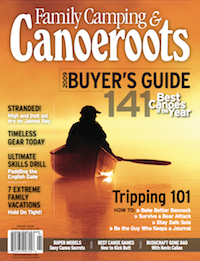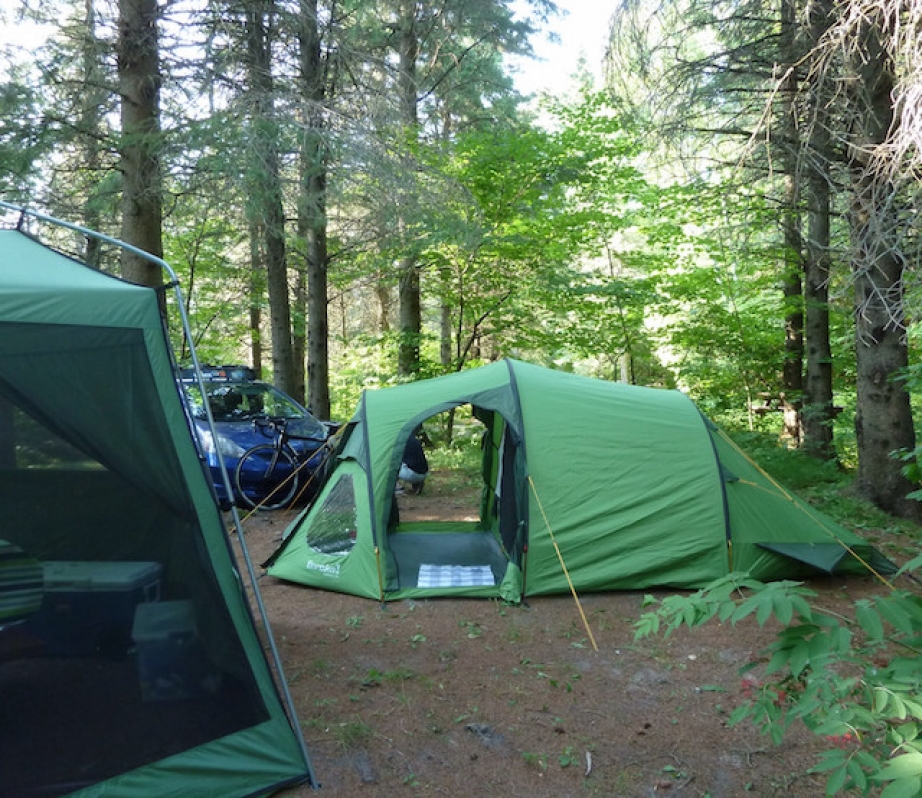I was excited about my new five-pound refillable propane tank. I had two buttered cheese sandwiches in the frying pan and two hungry campers begging for food. It was our first father-toddlers camping trip and I just then remembered the safe place in my basement where I’d left the adapter hose that connects my new tank to my Coleman stove.
What happened next is a bit shaky, like the real life video footage from an episode of COPS. Driven to crime by hungry, whining children, I stole the green canister from my neighbour’s abandoned picnic table.
Upon their return I thought it best to confess. I’m glad I did. The two large middle-aged men were, I’m certain, linked to the Russian mafia—or let’s just say one was in importing and the other was a simple truck driver who just purchased a new BMW 760.
I know all this because they invited us back for souvlaki skewers cooked over their fire. After the kids were tucked into their sleeping bags, I returned to share a $200 bottle of Johnny Walker Blue toasting the new automobile.
My first 20 years of camping I did in remote places—mountains, lakes and rivers— where seeing another group was grounds to keep moving to a different spot. Since starting a family, one of the many changes I’ve had to accept is trading these solitary sojourns for a more convivial camping atmosphere.
A few weeks after the propane incident, I spent the August long weekend at the busiest campground in the Highway 60 corridor of Algonquin Park. Packed into the knot of campsites were nearly 300 people—more than the population of the two towns in which I live and work.
Ziggy was the first person I asked to borrow a corkscrew. The twenty-something hippy girl across the campsite road rummaged through embroidered pouches and secret compartments in her chartreuse Westfalia. Nothing.
The campers to the left were Baptist and said they didn’t drink, although the teenage son suggested we just sink the cork. I said thanks and moved on before the questioning began.
On the other side, a young couple cuddled close to the fire, wine glasses in hand. Perfect. Except they’d forgotten a corkscrew too and grabbed a screw-off bottle on their way to the campground.
Finally, I met Harry Sarin, a radiologist at a big hospital in the city, and his wife, a nurse on leave raising their three children.
It was their first time camping with kids, but by the looks of their sun-faded pup tents and micro stoves (and yes, a corkscrew) I guessed that they’d backpacked Europe.
The following morning, Harry wandered over asking if we had sugar for their coffee. We handed him a bottle of maple syrup. It was the best we could do. Over breakfast the kids became fast friends and we planned an all-day hike and cycle together.
Campgrounds like these aren’t about wilderness. To me they are about being surrounded by like-minded outdoor families— people you get to know more in a weekend than you do your neighbours at home.
Campground neighbours give what you don’t have, loan you what you’ve forgotten. They pick things up in town and leave you their worms and leftover wood. They boost dead batteries and return stray Frisbees. These neighbours make family camping more fun than it would be without them.
And, campground neighbours forgive you for stealing propane canisters and don’t ask truck drivers how they afford $200,000 European luxury sedans.

This article first appeared in the Spring 2009 issue of Canoeroots Magazine.




